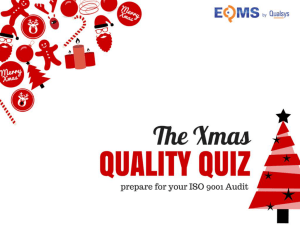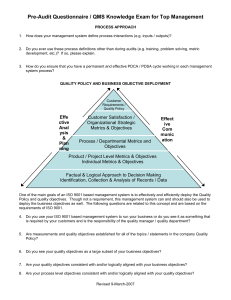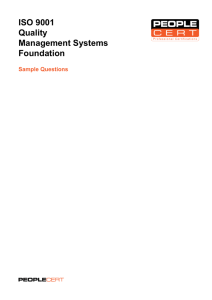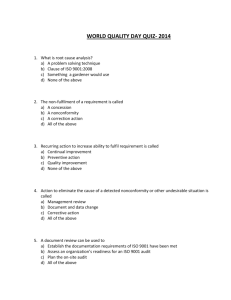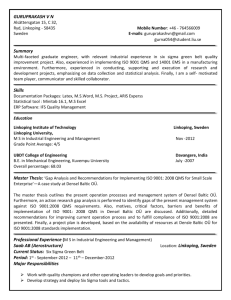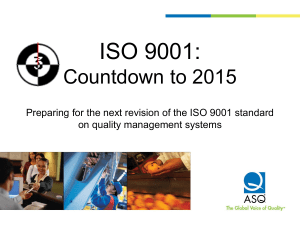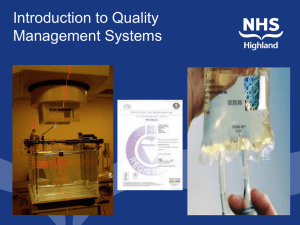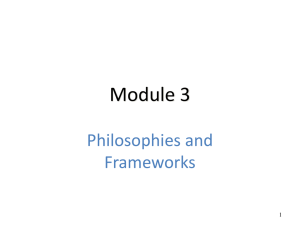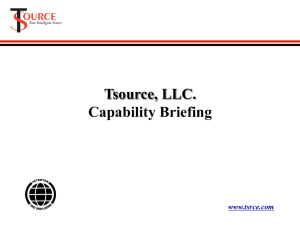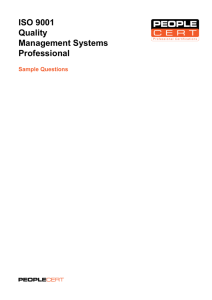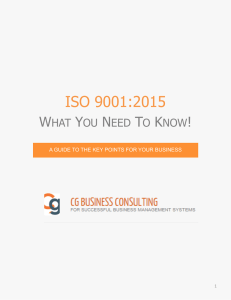A Review ISO 9001:2015 Draft What`s Important to Know Now
advertisement
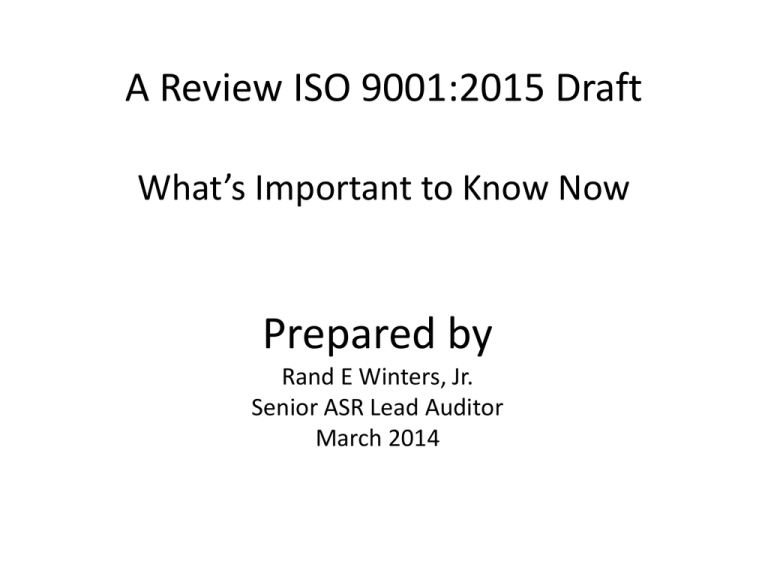
A Review ISO 9001:2015 Draft What’s Important to Know Now Prepared by Rand E Winters, Jr. Senior ASR Lead Auditor March 2014 ISO 9001 – Under Revision • Review based on ISO Working Draft 9001 – 6/13. • Further revisions likely to occur. • Firms may wish to consider these changes and plan accordingly . • New revisions slated for release Sept 2015 with full implementation Sept 2018. • Draft revisions now 21 pages of requirements compared to 9 pages in the 2008 revised standard Objective of Revisions • Enhance an organization’s ability to satisfy customers. • Maintain relevance, provide integrated approach to organizational management, and integrate with other management systems. • Reflect needs of all user groups and increasingly complex operating environments. • Set a consistent foundation for next 10 years. What’s New? • Risk management is being added with focus on risk-based thinking. Identification of risk and risk control now a requirement. • Standardized core text, structure, definitions enable organizations with multiple management systems to achieve improved integration & implementation. • Major focus on achieving value for organization and its customers. • Revisions allow ISO 9001 to be more applicable by “servicebased” organizations. • Primary focus remains on Customers! What Prompted Revisions? • • • Business and industry has changed. Greater diversity of ISO 9001 users and broader interests of users. Knowledge and technology developments. QMS Structure Re-organized 4. Context of Organization – addresses needs and expectations of interested parties, scope of QMS 5. Leadership – addresses management commitment, policy, roles, responsibility & authority 6. Planning – includes risks, opportunities, objectives and plans to achieve them, the planning of changes 7. Support – includes resources, competence, awareness, communication, documented information Structure Re-organized 8. Operation – includes planning & control, determine market needs, interaction w/customers, planning process, control of external provisions of goods/services, production of goods, provision of services, release of goods/services, non-conforming goods/services 9. Performance Evaluation – includes monitoring, measurement, analysis & evaluation, internal audit, management review Structure Outlined 10. Improvement – addresses non-conformity & corrective action, improvement Timeline to Revision Release and Client Transition 2013 2014 2015 June 2013 CD (Committee Draft) April 2014 DIS (Draft International Standard) July 2015 FDIS (Final Draft International Standard) September 2015 (Published International Standard) Timeline to Revision Release and Client Transition 2015 2016 2017 2018 September 2015 Published International Standard September 2015 start of 3 years transition period to September 2018 What Should an Organization do Now? Nothing at this time ( well almost nothing). Still too early in the 2015 revision process of ISO 9001 to make any significant changes to an existing QMS. Some issues drafted may change or disappear in upcoming drafts or with final version. Looking ahead…existing registered system documentation should conform with some small adjustments. In most cases, existing registered organizations should have enough documentation and records. Since risk is documented in most sections of proposed revision to ISO 9001, consider starting your risk management plan, if you don’t have one. Begin thinking how to address risk in your business. Considering Risk • • • Risk is very detailed in this revision to the standard as compared to ISO 13485, Food Safety, or Aerospace. Think about adding/using words that are typical in the risk process such as risk determination, risk control, risk mitigation, acceptable level of risk. Next slide outlines the four phases of managing risk, and maybe helpful as an organization addresses risk to their business. Four Phases of Risk Risk Analysis INTENDED USE Identification HAZARD identification RISK estimation Risk Control OPTION analysis Implementation of measures RESIDUAL RISK evaluation Overall RISK acceptance Risk Evaluation RISK acceptability decisions RISK ASSESSMENT Post Production Information Post-production experience Review of RISK MANAGEMENT experience- customer use Take appropriate actions Where Risk is Addressed in 2013 Draft • 3.09 Risk - effect of uncertainty (definition) • 4.1 Organization shall take account of these issues for determining risk. • 4.4 QMS - determine risk if unintended output produced. • 5.1 Leadership - ensuring risks that could affect meeting product requirements … managed. • 6.1 Actions to address risk and opportunities. Risk Continued • 6.3 Planning and Controlling Changes a) identification of risk and control measures associated with product • 8.4 Control of External Processes or Products- evaluation based on risks and risk control • 8.5.1 Design and Development, define c) risk • 8.5.3 Implement c) risk control measures • 8.6 Execution/Implementation 8.6.1h) implementation of risk controls • 9.3 Management Review b) determined risks Related Information & Updates • Once ISO 9001 is revised, expect to see changes to industry-specific standards and other supporting documents. • Monitor ASR’s newsletter and website for future releases of the revisions to ISO 9001. • If you have any questions, please contact ASR – 888-891-9002 info@asrworldwide.com Thank you
